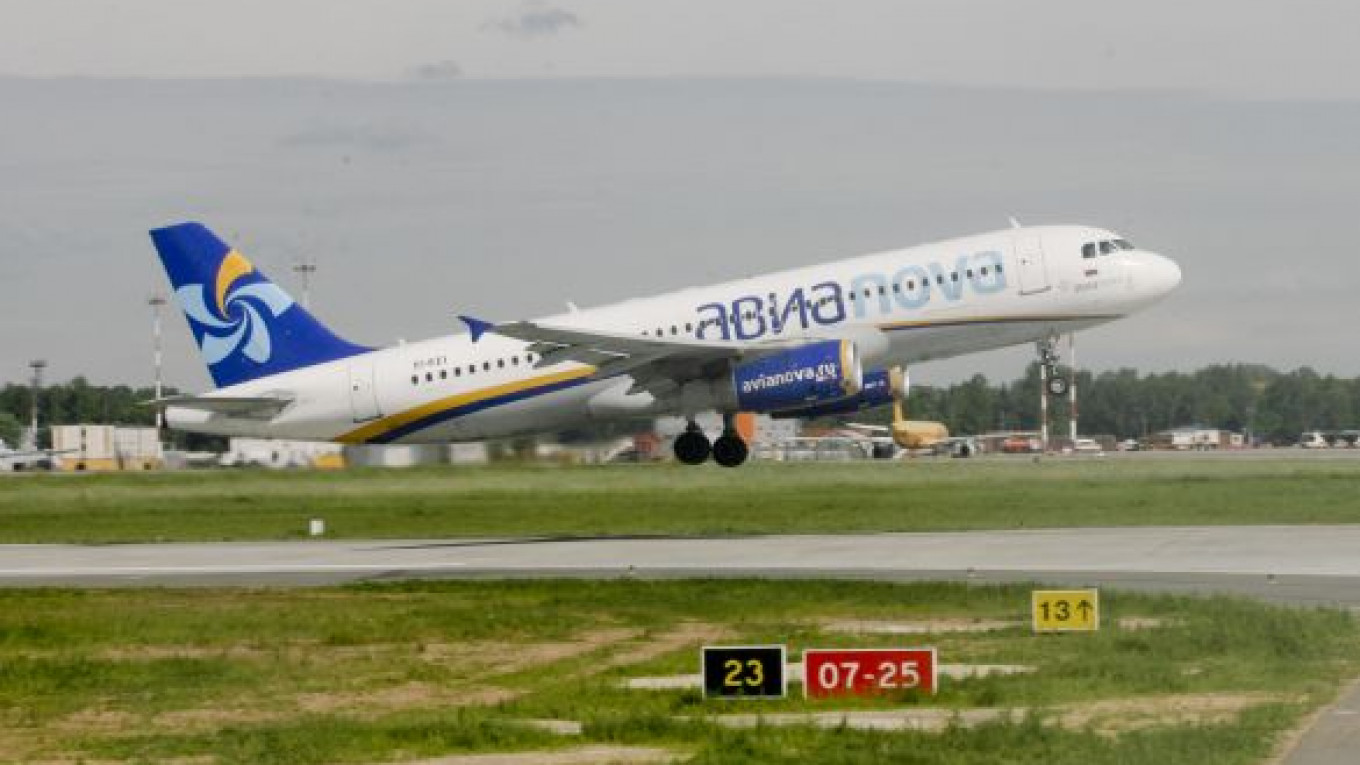Alfa Group's investment arm A1 decided to sell its 51 percent stake in Avianova in late 2010, said Dmitry Chernyak, former managing director of the investment group, who quit in March this year.
The discount airline, which is involved in a scandal concerning locked-out foreign employees, has been on the block for several months, a source close to the carrier confirmed.
The stake has been offered to Aeroflot, the source said. But Aeroflot management decided not to buy it. The company's attention is focused elsewhere — Aeroflot is preoccupied integrating six regional airlines it is getting from Russian Technologies, the source said. Spokespeople from A1 and Aeroflot declined to comment.
A1 wants $70 million for the Avianova stake, said one manager of an investment company. A source close to A1 says the entire airline is valued at $150 million.
Chernyak told Vedomosti that he is willing to buy into the project. He said he and a "first-class institutional investor," which he declined to name, could finance the purchase themselves.
Chernyak also wouldn't say how much he is willing to offer for the stake. He maintains that it will be profitable for A1. One of Chernyak's acquaintances says he is talking about an offer of $35 million.
Avianova is not yet two years old. It started flying in August 2009. But it is already in 11th place in terms of passenger traffic. It flies exclusively domestic routes, except for Moscow-Simferopol. At its start, the budget airline launched a massive advertising campaign, promoting its base fare of 250 rubles (about $9) — not including taxes and fees.
A1 and its partner American fund Indigo Partners — which has 49 percent — invested $65 million in the project, according to sources close to Avianova. Those funds have already been spent, and the company needs another $30 million to $40 million.
A1 is not in the mood to invest more, a source told Vedomosti. As a result, the company has not been getting any investment for the last few months, and has been surviving on its own income. According to forecasts, the company should be out of the red by 2012.
But as a result of the current situation, Avianova had to cancel plans to expand its existing fleet of six Airbus A320s to 10.
This could be the reason why its market share has dropped. The drop in passenger volume is also due to the reduced number of seats in the aircraft. The craft can carry 180 passengers, but, like most foreign aircraft, were liable for a 20 percent customs duty.
This worked out to an annual additional expense per aircraft of $10 million, including VAT, said former Avianova head Andrew Pyne.
In 2010 the Russian government canceled the duty on aircraft with up to 160 seats. The extra seats were removed at the expense of passenger capacity. Now, the customs rules have been tweaked to allow up to 170 seats.
Also, this year Avianova planned to start charter flights on international routes. But the company scrapped that after a check by the federal aviation regulator concerning passenger complaints about frequent flight delays and cancellations.
All of these complications led to Pyne's removal from the company. It is legally forbidden for a foreigner to be general manager of an airline, so Pyne held the post of general manager of an offshore company called Whitefish Aviation, founded by A1 and Indigo. He also headed Alaved, which provided consulting services to Avianova.
Pyne was recently refused admittance to the office of Avianova, with the excuse that he is not an employee of the company, said a source close to the airline. Another three foreign executives at the company allegedly suffered the same fate.
Avianova announced an internal investigation "concerning a number of foreigners who were working" with the company. On July 18 the board of directors will discuss the question of "ending work" with those people.
Don't expect a profit from Avianova for some time, said Ingosstrakh-
Investitsia analyst Yevgeny Shago. The airline business is not considered to be overall very profitable. From this perspective, A1's departure from the project seems logical, the expert said. Moreover, Alfa Group is used to big and profitable business projects.
A Message from The Moscow Times:
Dear readers,
We are facing unprecedented challenges. Russia's Prosecutor General's Office has designated The Moscow Times as an "undesirable" organization, criminalizing our work and putting our staff at risk of prosecution. This follows our earlier unjust labeling as a "foreign agent."
These actions are direct attempts to silence independent journalism in Russia. The authorities claim our work "discredits the decisions of the Russian leadership." We see things differently: we strive to provide accurate, unbiased reporting on Russia.
We, the journalists of The Moscow Times, refuse to be silenced. But to continue our work, we need your help.
Your support, no matter how small, makes a world of difference. If you can, please support us monthly starting from just $2. It's quick to set up, and every contribution makes a significant impact.
By supporting The Moscow Times, you're defending open, independent journalism in the face of repression. Thank you for standing with us.
Remind me later.


